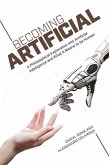Diagnostic Expertise in Organizational Environments provides a state-of-the-art foundation for a new paradigm in expertise research and practice.Skilled diagnosis is essential for accurate and efficient performance across a range of organizational contexts, including aviation, finance, rail, forensic investigation, firefighting, and medicine. However, it is also a complex process, subject to the abilities and experience of individual operators, the culture and practices of organizations, the relationships between operators, and the availability and usefulness of technology. As a consequence, diagnostic skills can be difficult to learn, maintain, and evaluate.This volume is a comprehensive approach that examines diagnostic expertise at the level of the individual practitioner, in the social context, and at the organizational level. The chapter authors comprise both academics and highly skilled practitioners so that there is a clear transition from understanding the problem of diagnostic skills to the implementation of solutions, either through redesign, training, and/or selection. It will appeal to those academics and practitioners interested and involved in this field and also prove useful to students of psychology, cognitive science education and/or computer interaction.
Dieser Download kann aus rechtlichen Gründen nur mit Rechnungsadresse in A, B, BG, CY, CZ, D, DK, EW, E, FIN, F, GR, HR, H, IRL, I, LT, L, LR, M, NL, PL, P, R, S, SLO, SK ausgeliefert werden.









